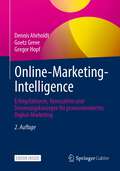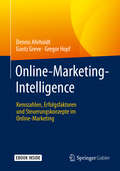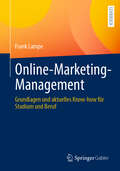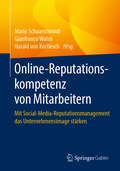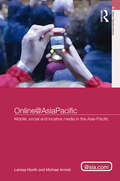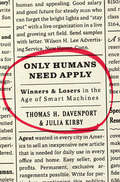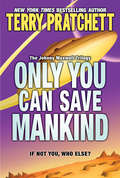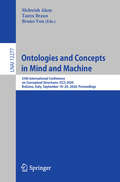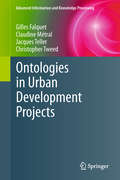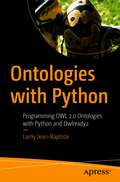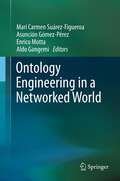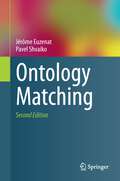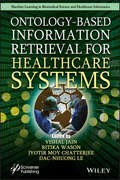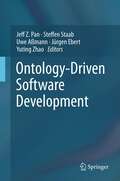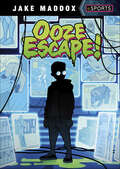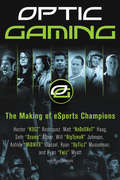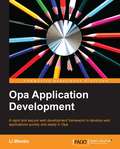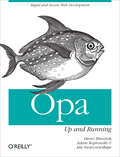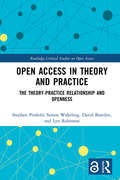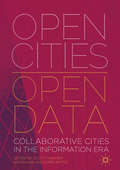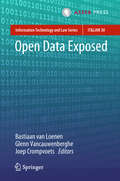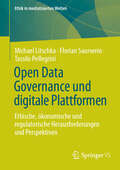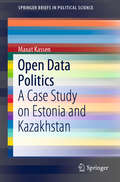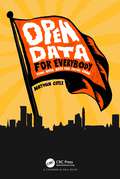- Table View
- List View
Online-Marketing-Intelligence: Erfolgsfaktoren, Kennzahlen und Steuerungskonzepte für praxisorientiertes Digital-Marketing
by Dennis Ahrholdt Goetz Greve Gregor HopfDieses Buch bietet für den Einsatz und die Ausgestaltung vielfältiger Online-Marketing-Instrumente und deren Erfolgsmessung konkrete Hilfestellung. Die Autoren haben dazu eine bislang einzigartige Übersicht über die Kennzahlen für die wichtigsten Instrumente im Digital-Marketing zusammengestellt. Sie beschreiben über 170 Online-Marketing-KPIs, die in unterschiedlichen Kontexten und entlang der Customer Journey eingesetzt werden können. Damit geben Sie Hilfestellungen für eine leistungsfähige Online-Marketing-Analytics. Das Ziel: trotz zunehmender Komplexität im Performance-Marketing eine bestmögliche Attribution und kontinuierliche Optimierung zu erreichen.Ebenso wichtig: die Betrachtung der einzelnen Instrumente basiert auf Ergebnissen von über 200 empirischen Forschungsarbeiten. Macher und Entscheider im Marketing erhalten damit sowohl Sicherheit über Wirkzusammenhänge, aber auch neue Ideen für die Erfolg versprechende Ausgestaltung ihrer Marketinginstrumente und Marketingkampagnen.Die Autoren richten damit insgesamt eine Online-Marketing-Intelligence für die Praxis aus, indem sie in umfangreicher und innovativer Form handlungsorientiertes Online-Marketing-Wissen zusammenstellen. Sie finden in diesem Buch eine Fülle von wertvollen Empfehlungen und Tipps, um ihr Online-Marketing auf state-of-the-art Niveau zu betreiben und im Wettbewerb zu bestehen. Die 2. Auflage ist vollständig überarbeitet, praxisorientiert präzisiert und erhält mehrere neue Kapitel und Abschnitte - bspw. zu einer Erfolgskontrolle, die Online-Marketing-Instrumente übergreifend betrachtet, zum Influencer-Marketing, zu einem praxiserprobten Ablaufschema für Suchmaschinenoptimierung, oder ortsgebundenes Mobile-Marketing; ferner wurden über 20 weitere Kennzahlen und innovative Tipps sowie neueste Erkenntnisse aus weiteren über 30 empirischen Forschungsarbeiten ergänzt.Aus dem InhaltKPIs und Erfolgsfaktoren für Display-Marketing, Suchmaschinen-Marketing, Social-Media-Marketing, Influencer-Marketing, E-Mail-Marketing, Mobile-Marketing, Website- bzw. Online-Shop-MarketingÜbergreifende Betrachtung von Online-MarketingaktivitätenAnwenderfreundlich aufbereitete Zusammenstellung der wesentlichen Erkenntnisse aus der Forschung für die PraxisOriginelle Tipps für Erfolg versprechendes Online-MarketingEmpfehlungen für den Aufbau einer Online-Marketing-Intelligence
Online-Marketing-Intelligence: Kennzahlen, Erfolgsfaktoren und Steuerungskonzepte im Online-Marketing
by Dennis Ahrholdt Goetz Greve Gregor HopfDieses Buch bietet eine bislang einzigartige Übersicht über Kennzahlen der wichtigsten Online-Marketinginstrumente verbunden mit einer fundierten Betrachtung der Instrumente und Erfolgszusammenhängen aus empirischen Forschungsergebnissen.Aufgrund der Fülle an verfügbaren Instrumenten und Daten fehlt dem Marketing-Management häufig ein Überblick, mit welchen Kennzahlen sich der Erfolgsbeitrag ihrer Online-Marketing-Aktivitäten bestmöglich messen und dokumentieren lässt. Somit fällt auch die Entscheidung zur Ausgestaltung der Online-Marketing-Aktivitäten schwer: Das Verständnis über Erfolgszusammenhänge ist häufig nur rudimentär vorhanden. Die Autoren beschreiben über 150 Kennzahlen, die in unterschiedlichen Kontexten und entlang der Customer Journey eingesetzt werden können. Sie geben auch Hilfestellungen für die Entwicklung einer Online-Marketing-Intelligence. Das Ziel: trotz zunehmender Komplexität der Online-Marketing-Instrumente eine bestmögliche Budgetallokation zu erreichen. Auch dafür haben sie aus empirischen Forschungsergebnissen instrumentspezifische Erfolgszusammenhänge und -Faktoren für den Business-Alltag extrahiert.Der Praktiker findet in diesem Buch eine Fülle von Handlungsempfehlungen für sein Online-Marketing, um es – auch unter Berücksichtigung empirisch identifizierter Erfolgszusammenhänge – auf state-of-the-art Niveau zu betreiben.
Online-Marketing-Management: Grundlagen und aktuelles Know-how für Studium und Beruf
by Frank LampeDieses Buch ist ein umfassender Leitfaden für das Management von Online-Marketing-Aktivitäten, um Unternehmen erfolgreich in der digitalen Welt zu positionieren. Es richtet sich an Praktiker und Studierende, die sowohl Grundlagen als auch fortgeschrittene Taktiken des Online-Marketings kennenlernen und anwenden wollen.Wie können Unternehmen ihren Online-Auftritt optimieren? Welche Rolle spielt Social-Media bei der Kundenbindung? Wie lässt sich der Umsatz durch gezielte Maßnahmen steigern? Im Mittelpunkt des Buches stehen die Entwicklung eines umfassenden und schlüssigen Online-Marketing-Konzepts sowie praxiserprobte Strategien, Checklisten und Tipps zur Bewältigung der zentralen Herausforderungen. Sie erhalten das Handwerkszeug, um erfolgreiche Kampagnen zu planen, durchzuführen und zu optimieren. Ein Buch für alle, die ihre eigenen Karrierechancen fördern und den ständigen Veränderungen in der Welt des Online-Marketings proaktiv begegnen wollen.
Online-Reputationskompetenz von Mitarbeitern: Mit Social-Media-Reputationsmanagement das Unternehmensimage stärken
by Gianfranco Walsh Mario Schaarschmidt Harald Von Korflesch?In diesem Buch dreht sich alles um das Online-Reputationsmanagement. Dabei geht es um die Fragen, wie Mitarbeiter Social Media nutzen und welchen Einfluss Sie damit auf das Image eines Unternehmens haben können.Mit klaren Handlungsanweisungen zeigt Ihnen dieses Buch, wie Sie mithilfe eines sinnvollen Online-Reputationsmanagements Ihre Mitarbeiter in Bezug auf Risiken und Gefahren, die von Social Media ausgehen, wappnen können.Die Autoren beschäftigen sich mit verschiedenen Phänomenen, die in Zusammenhang mit den Mitarbeitern eines Unternehmens interessant sind. Es geht beispielsweise um Strategien zur Messung der Social-Media-Kompetenz eines Mitarbeiters in Bezug auf die Unternehmensreputation oder die Analyse von Unternehmensbewertungsportalen.
Online-Verkauf. Wie man mit dem Verkauf auf eBay, Amazon, Fiverr und Etsy Geld verdient
by Nick Vulich Tetyana Schindler"Online-Verkauf" ist deine schrittweise Anleitung zum E-Commerce-Erfolg. Dieses Buch stellt dir die großen vier Online-Plattformen vor: eBay, Amazon, Fiverr und Etsy. Möchtest du lernen, wie man online verkauft? Der Autor, Nick Vulich, hat in den letzten vierzehn Jahren über 29.000 Transaktionen auf eBay abgeschlossen. Er kennt alle Details des Verkaufs auf eBay, Amazon und Fiverr in- und auswendig und bietet dir an, dich bei der Hand zu nehmen und durch den Verkaufsprozess zu führen. Bist du neu beim E-Commerce? Schlägst du dich gerade mit dem Versuch herum, zu entscheiden, wie du loslegen kannst? Nur keine Panik. Dieses Buch wird dich durch alles führen, was du wissen musst, um noch heute mit dem Online-Verkauf zu beginnen. Jeder träumt davon, online Geld zu verdienen. Wer hätte nicht gerne einen Job, bei dem man zu Hause im Schlafanzug oder in Unterwäsche arbeiten kann? Einen Job, wo du keinen Chef hast, der dir auf die Nerven geht und dir sagt, was, wie oder wann du etwas zu tun hast? Online-Verkauf kann all das und vieles mehr sein. Entgegen der weitverbreiteten Meinung ist es aber nicht so einfach. Du wirst zwar keinen Chef haben, der dich nervt und dir sagt, was du zu tun hast, aber du wirst härter arbeiten müssen als du es jemals in deiner normalen Arbeit getan hast. Du wirst knapp bei Kasse sein, besonders am Anfang. Nur weil du beschließt, deine Waren auf eBay, Amazon oder irgendeiner anderen Webseite anzupreisen, bedeutet das noch lange nicht, dass Käufer wie durch Zauberhand zu deinen Artikeln strömen und dich mit Geld überhäufen werden. Wie alles andere braucht ein erfolgreicher Verkauf von Produkten oder Dienstleistungen online seine Zeit. Jeder kann online Artikel auflisten und ein paar schnelle Verkäufe erzielen. Um jedoch ein erfolgreicher Online-Verkäufer zu sein, muss man diesen Prozess tagtäglich und Monat für Monat wiederholen.
Online@AsiaPacific: Mobile, Social and Locative Media in the Asia–Pacific (Asia's Transformations/Asia.com)
by Larissa Hjorth Michael ArnoldMedia across the Asia-Pacific region are at once social, locative and mobile. Social in that these media facilitate public and interpersonal interaction, locative in that this social communication is geographically placed, and mobile in so much as the media is ever-present. The Asia–Pacific region has been pivotal in the production, shaping and consumption of personal new media technologies and through social and mobile media we can see emerging certain types of personal politics that are inflected by the local. The six case studies that inform this book—Seoul, Tokyo, Shanghai, Manila, Singapore and Melbourne—offer a range of economic, socio-cultural, and linguistic differences, enabling the authors to provide new insights into specific issues pertaining to mobile media in each city. These include social, mobile and locative media as a form of crisis management in post 3/11 Tokyo; generational shifts in Shanghai; political discussion and the shifting social fabric in Singapore; and the erosion of public and private, and work and leisure paradigms in Melbourne. Through its striking case studies, this book sheds new light on how the region and its contested and multiple identities are evolving, and concludes by revealing the impact of mobile media on how place is shaped, as well as shaping, practices of mobility, intimacy and a sense of belonging. Employing comprehensive, cross-disciplinary frameworks from theoretical approaches such as media sociology, ethnography, cultural studies and media and communication studies, Online@AsiaPacific will be of huge interest to students and scholars of Asian culture and society, cybercultures, new media studies, communication studies and internet studies.
Only Humans Need Apply: Winners & Losers in the Age of Smart Machines
by Thomas H. Davenport Julia KirbyHow should we adapt to an AI-driven future? “The world the authors describe may be unsettling, but it is [one we] will likely live to see.” —The Wall Street JournalNearly half of all working Americans could be at risk losing their jobs because of technology. That includes millions of knowledge workers—writers, paralegals, assistants, medical technicians—now threatened by accelerating advances in artificial intelligence.The industrial revolution shifted workers from farms to factories. In Era One of automation, machines relieved humans of manually exhausting work. Today, Era Two of automation continues to wash across the entire services-based economy that has replaced jobs in agriculture and manufacturing. Era Three, and the rise of AI, is dawning. Smart computers are demonstrating they are capable of making better decisions than humans. Brilliant technologies can now decide, learn, predict, and even comprehend much faster and more accurately than the human brain, and their progress is accelerating. Where will this leave lawyers, nurses, teachers, and editors? How do we find sustainable careers in the near future?Only Humans Need Apply reframes the conversation about automation, arguing that the future of increased productivity and business success isn’t either human or machine. It’s both. The key is augmentation, utilizing technology to help humans work better, smarter, and faster. Instead of viewing these machines as competitive interlopers, we can see them as partners and collaborators in creative problem-solving as we move into the next era together. The choice is ours.“A fine call to action in the face of uncertainty.” —Financial Times
Only You Can Save Mankind (Johnny Maxwell Trilogy #1)
by Terry PratchettThe alien spaceship is in his sights. His finger is on the Fire button. Johnny Maxwell is about to set the new high score on the computer game Only You Can Save Mankind. <P><P>Suddenly:We wish to talk. <P><P>Huh? <P><P> We surrender. <P><P>The aliens aren't supposed to surrender -- they're supposed to die! Now what is Johnny going to do with a fleet of alien prisoners who know their rights under the international rules of war and are demanding safe-conduct? It's hard enough trying to save Mankind from the Galactic Hordes. It's even harder trying to save the Galactic Hordes from Mankind. <P><P>But it's just a game, isn't it? Isn't it? <P><P>Master storyteller Terry Pratchett leaves readers breathless -- with laughter, and with suspense -- in a reality-bending tale of virtual heroism.
Ontologies and Concepts in Mind and Machine: 25th International Conference on Conceptual Structures, ICCS 2020, Bolzano, Italy, September 18–20, 2020, Proceedings (Lecture Notes in Computer Science #12277)
by Mehwish Alam Tanya Braun Bruno YunThis book constitutes the proceedings of the 25th International Conference on Conceptual Structures, ICCS 2020, held in Bolzano, Italy, in September 2020.* The 10 full papers, 5 short papers and 1 poster paper presented were carefully reviewed and selected from 24 submissions. The proceedings also include two keynotes and two tutorials. The papers focus on the representation of and reasoning with conceptual structures in a variety of contexts. The topics of this year's conference range from formal concept analysis to decision making, from machine learning to natural language processing. *The conference was held virtually due to the COVID-19 pandemic.
Ontologies in Urban Development Projects
by Jacques Teller Claudine Métral Christopher Tweed Gilles FalquetOntologies are increasingly recognized as essential tools in information science. Although the concepts are well understood theoretically , the practical implementation of ontologies remains challenging. In this book, researchers in computer science, information systems, ontology engineering, urban planning and design, civil and building engineering, and architecture present an interdisciplinary study of ontology engineering and its application in urban development projects. The first part of the book introduces the general notion of ontology, describing variations in abstraction level, coverage, and formality. It also discusses the use of ontologies to achieve interoperability, and to represent multiple points of view and multilingualism. This is illustrated with examples from the urban domain. The second part is specific to urban development. It covers spatial and geographical knowledge representation, the creation of urban ontologies from various knowledge sources, the interconnection of urban models and the interaction between standards and domain models. The third part presents case studies of the development of ontologies for urban mobility, urban morphological processes, road systems, and cultural heritage. Other cases report on the use of ontologies to solve urban development problems, in construction business models, building regulations and urban regeneration. It concludes with a discussion of key challenges for the future deployment of ontologies in this domain. This book bridges the gap between urban practitioners and computer scientists. As the essence of most urban projects lies in making connections between worldviews, ontology development has an important role to play, in promoting interoperability between data sources, both formal (urban databases, Building Integrated Models, Geographical Information Systems etc.) and less formal (thesauri, text records, web sources etc.). This volume offers a comprehensive introduction to ontology engineering for urban development. It is essential reading for practitioners and ontology designers working in urban development.
Ontologies with Python: Programming OWL 2.0 Ontologies with Python and Owlready2
by Lamy Jean-BaptisteUse ontologies in Python, with the Owlready2 module developed for ontology-oriented programming. You will start with an introduction and refresher on Python and OWL ontologies. Then, you will dive straight into how to access, create, and modify ontologies in Python. Next, you will move on to an overview of semantic constructs and class properties followed by how to perform automatic reasoning. You will also learn about annotations, multilingual texts, and how to add Python methods to OWL classes and ontologies. Using medical terminologies as well as direct access to RDF triples is also covered. Python is one of the most used programming languages, especially in the biomedical field, and formal ontologies are also widely used. However, there are limited resources for the use of ontologies in Python. Owlready2, downloaded more than 60,000 times, is a response to this problem, and this book is the first one on the topic of using ontologies with Python.What You Will LearnUse Owlready2 to access and modify OWL ontologies in PythonPublish ontologies on dynamic websitesPerform automatic reasoning in PythonUse well-known ontologies, including DBpedia and Gene Ontology, and terminological resources, such as UMLS (Unified Medical Language System)Integrate Python methods in OWL ontologies Who Is This Book ForBeginner to experienced readers from biomedical sciences and artificial intelligence fields would find the book useful.
Ontology Engineering in a Networked World
by Aldo Gangemi Asunción Gómez-Pérez Enrico Motta Mari Carmen Suárez-FigueroaThe Semantic Web is characterized by the existence of a very large number of distributed semantic resources, which together define a network of ontologies. These ontologies in turn are interlinked through a variety of different meta-relationships such as versioning, inclusion, and many more. This scenario is radically different from the relatively narrow contexts in which ontologies have been traditionally developed and applied, and thus calls for new methods and tools to effectively support the development of novel network-oriented semantic applications. This book by Suárez-Figueroa et al. provides the necessary methodological and technological support for the development and use of ontology networks, which ontology developers need in this distributed environment. After an introduction, in its second part the authors describe the NeOn Methodology framework. The book's third part details the key activities relevant to the ontology engineering life cycle. For each activity, a general introduction, methodological guidelines, and practical examples are provided. The fourth part then presents a detailed overview of the NeOn Toolkit and its plug-ins. Lastly, case studies from the pharmaceutical and the fishery domain round out the work. The book primarily addresses two main audiences: students (and their lecturers) who need a textbook for advanced undergraduate or graduate courses on ontology engineering, and practitioners who need to develop ontologies in particular or Semantic Web-based applications in general. Its educational value is maximized by its structured approach to explaining guidelines and combining them with case studies and numerous examples. The description of the open source NeOn Toolkit provides an additional asset, as it allows readers to easily evaluate and apply the ideas presented.
Ontology Matching
by Jérôme Euzenat Pavel ShvaikoOntologies tend to be found everywhere. They are viewed as the silver bullet for many applications, such as database integration, peer-to-peer systems, e-commerce, semantic web services, or social networks. However, in open or evolving systems, such as the semantic web, different parties would, in general, adopt different ontologies. Thus, merely using ontologies, like using XML, does not reduce heterogeneity: it just raises heterogeneity problems to a higher level. Euzenat and Shvaiko's book is devoted to ontology matching as a solution to the semantic heterogeneity problem faced by computer systems. Ontology matching aims at finding correspondences between semantically related entities of different ontologies. These correspondences may stand for equivalence as well as other relations, such as consequence, subsumption, or disjointness, between ontology entities. Many different matching solutions have been proposed so far from various viewpoints, e. g. , databases, information systems, and artificial intelligence. The second edition of Ontology Matching has been thoroughly revised and updated to reflect the most recent advances in this quickly developing area, which resulted in more than 150 pages of new content. In particular, the book includes a new chapter dedicated to the methodology for performing ontology matching. It also covers emerging topics, such as data interlinking, ontology partitioning and pruning, context-based matching, matcher tuning, alignment debugging, and user involvement in matching, to mention a few. More than 100 state-of-the-art matching systems and frameworks were reviewed. With Ontology Matching, researchers and practitioners will find a reference book that presents currently available work in a uniform framework. In particular, the work and the techniques presented in this book can be equally applied to database schema matching, catalog integration, XML schema matching and other related problems. The objectives of the book include presenting (i) the state of the art and (ii) the latest research results in ontology matching by providing a systematic and detailed account of matching techniques and matching systems from theoretical, practical and application perspectives.
Ontology-Based Information Retrieval for Healthcare Systems
by Ritika Wason Dac-Nhuong Le Jyotir Moy Chatterjee Vishal JainWith the advancements of semantic web, ontology has become the crucial mechanism for representing concepts in various domains. For research and dispersal of customized healthcare services, a major challenge is to efficiently retrieve and analyze individual patient data from a large volume of heterogeneous data over a long time span. This requirement demands effective ontology-based information retrieval approaches for clinical information systems so that the pertinent information can be mined from large amount of distributed data.This unique and groundbreaking book highlights the key advances in ontology-based information retrieval techniques being applied in the healthcare domain and covers the following areas: Semantic data integration in e-health care systems Keyword-based medical information retrieval Ontology-based query retrieval support for e-health implementation<br style="background-color: transparent; box-sizing: border-box; color: #455464; font-family: " sourcesanspro","helvetica neue","helvetica",arial,sans-serif; font-size: 1
Ontology-Driven Software Development
by Steffen Staab Jeff Z. Pan Jürgen Ebert Uwe Aßmann Yuting ZhaoThis book is about a significant step forward in software development. It brings state-of-the-art ontology reasoning into mainstream software development and its languages. Ontology Driven Software Development is the essential, comprehensive resource on enabling technologies, consistency checking and process guidance for ontology-driven software development (ODSD). It demonstrates how to apply ontology reasoning in the lifecycle of software development, using current and emerging standards and technologies. You will learn new methodologies and infrastructures, additionally illustrated using detailed industrial case studies. The book will help you: Learn how ontology reasoning allows validations of structure models and key tasks in behavior models.Understand how to develop ODSD guidance engines for important software development activities, such as requirement engineering, domain modeling and process refinement.Become familiar with semantic standards, such as the Web Ontology Language (OWL) and the SPARQL query language.Make use of ontology reasoning, querying and justification techniques to integrate software models and to offer guidance and traceability supports.This book is helpful for undergraduate students and professionals who are interested in studying how ontologies and related semantic reasoning can be applied to the software development process. In addition, itwill also be useful for postgraduate students, professionals and researchers who are going to embark on their research in areas related to ontology or software engineering.
Ooze Escape! (Jake Maddox eSports)
by Jake MaddoxWhen Kendall receives a surprise email, he can hardly believe his luck. He’s been invited to compete in an esports tournament for his favorite game, Ooze Escape! He loves battling his way to the top level in the game and trying to escape the deadly ooze that burns up everything—and everyone—in its path. There’s just one problem—Kendall spends too much time battling enemies and looking for awesome loot. He always gets knocked out by the ooze before he can make his escape. Will he learn the strategies he needs to defeat his opponents and escape the ooze in time for the big tournament?
OpTic Gaming: The Making of eSports Champions
by Fwiz H3cz Midnite Scump Optic J Bigtymer NadeshotOpTic Gaming, the four-time Call of Duty Major League Gaming Champions and one of the top eSports teams in the world, now takes fans behind the controller--into the game and the minds of the greatest gamers in the world--in this fascinating and unique memoir and insider guide.Emerging on the scene in 2006, OpTic Gaming has dominated the Call of Duty e-sports arena, thanks to the talents of legendary players such as Matt "NaDeSHoT" Haag, the biggest eSports personality on earth; Seth "Scump" Abner, the best Call of Duty player in the world; Midnite, one of the first girl gamers to rise to stardom on YouTube; and Hector "H3CZ" Rodriguez, the team founder and CEO. With over 14 million followers across social platforms like Twitter, Facebook and YouTube, no other team of players in eSports can match OpTic's popularity or ability to bring fans into the game.Now, these remarkable players have collaborated to produce this one-of-a-kind book. In OpTic Gaming, they candidly share their story of becoming Call of Duty's global royalty--ESPN XGAMES, MLG, ESWC and GFINITY champions--laying bare their lives, exploring what it takes to make it in professional gaming, and speaking honestly about the consequences of their newfound fame. These best-of-the-best take you behind the controller, offering insights, knowledge, and strategies to help you improve your shot, master the most complex maps, and conquer the game with the ultimate weapons. Going beyond their number-one game, the team also discusses the rest of their lineups and how to become a champion in any arena. Revealing their go-to strategies, best missions, and favorite challenges, OpTic Gaming brings fans closer to these wildly popular professional gamers more than ever before.
Opa Application Development
by Li WenboIt is a tutorial guide to learning how to use Opa with JavaScript, Nodejs, and MongoDB to develop web applications easily and effectively.If you are a web developer who wants to get started with the Opa framework and build web applications with it? Then this book is for you. Web development experience is assumed and would be helpful.
Opa: Rapid and Secure Web Development
by Henri Binsztok Adam Koprowski Ida SwarczewskajaWant to simplify web development? This hands-on book shows you how to write frontend and backend code simultaneously, using the Opa framework. Opa provides a complete stack for web application development, including a web server, database engine, distribution libraries, and a programming language that compiles to JavaScript. You’ll learn step-by-step how to use Opa by building two projects through the course of the book: a wiki application similar to Wikipedia, and a Twitter-like micro-blogging platform. Discover how easy it is to use Opa to develop applications with real-time updates, database interactions, and web service design. Do you have JavaScript experience? You’re ready to get started.Learn fundamental concepts, including Opa’s functional programming styleDiscover how Opa compiles to JavaScript, using jQuery on the frontend and Node.js on the serverConstruct HTML resources dynamically and embed static resources on an Opa serverUse Opa’s method for performing CRUD operations and storing key-value pairs in MongoDBBuild an Opa user interface with the Bootstrap toolkit from TwitterLearn variant types, pattern-matching, polymorphic types, recursive functions, and other advanced featuresManage user accounts by building login forms, handling account activation, and tracking logged usersBuild a reactive UI—a real-time interface that continuously updates user events
Open Access in Theory and Practice: The Theory-Practice Relationship and Openness (Routledge Critical Studies on Open Access)
by David Bawden Lyn Robinson Stephen Pinfield Simon WakelingOpen Access in Theory and Practice investigates the theory-practice relationship in the domain of open access publication and dissemination of research outputs. Drawing on detailed analysis of the literature and current practice in OA, as well as data collected in detailed interviews with practitioners, policymakers, and researchers, the book discusses what constitutes ‘theory’, and how the role of theory is perceived by both theorists and practitioners. Exploring the ways theory and practice have interacted in the development of OA, the authors discuss what this reveals about the nature of the OA phenomenon itself and the theory-practice relationship. Open Access in Theory and Practice contributes to a better understanding of OA and, as such, should be of great interest to academics, researchers, and students working in the fields of information science, publishing studies, science communication, higher education policy, business, and economics. The book also makes an important contribution to the debate of the relationship between theory and practice in information science, and more widely across different fields of the social sciences and humanities
Open Cities | Open Data: Collaborative Cities in the Information Era
by Hoon Han Scott Hawken Christopher PetitToday the world’s largest economies and corporations trade in data and its products to generate value in new disruptive markets. Within these markets vast streams of data are often inaccessible or untapped and controlled by powerful monopolies. Counter to this exclusive use of data is a promising world-wide “open-data” movement, promoting freely accessible information to share, reuse and redistribute. The provision and application of open data has enormous potential to transform exclusive, technocratic “smart cities” into inclusive and responsive “open-cities”.This book argues that those who contribute urban data should benefit from its production. Like the city itself, the information landscape is a public asset produced through collective effort, attention, and resources. People produce data through their engagement with the city, creating digital footprints through social medial, mobility applications, and city sensors. By opening up data there is potential to generate greater value by supporting unforeseen collaborations, spontaneous urban innovations and solutions, and improved decision-making insights. Yet achieving more open cities is made challenging by conflicting desires for urban anonymity, sociability, privacy and transparency. This book engages with these issues through a variety of critical perspectives, and presents strategies, tools and case studies that enable this transformation.
Open Data Exposed (Information Technology and Law Series #30)
by Joep Crompvoets Bastiaan Van Loenen Glenn VancauwenbergheThe main objectives of this book are to expose key aspects that have a relevance when dealing with open data viewed from different perspectives and to provide appealing examples of how open data is implemented worldwide.The concept of open data as we know it today is the result of many different initiatives, both of a legislative and non-legislative nature, and promoted by a wide range of actors. Numerous regulatory antecedents to foster the concept of open data and embed it in national and international policy agendas have been undertaken on both sides of the Atlantic, as well as at a supranational level. The book highlights a number of the efforts made to promote open data in Europe, Asia and the United States. In addition to new insights, practical guidance and multiple disciplinary perspectives on open data, the book also addresses the transformation of current developments towards open data, which may be referred to as the democratisation of data. This book will support open data practitioners as well as open data scholars in their endeavours to promote open data implementation and research.Bastiaan van Loenen is associate professor and director of the Knowledge Centre Open Data at the Faculty of Architecture and The Built Environment of Delft University of Technology in the Netherlands, as is Glenn Vancauwenberghe, who is a post-doctoral researcher, and Joep Crompvoets is a professor at the Public Governance Institute of the KU Leuven in Belgium.
Open Data Governance und digitale Plattformen: Ethische, ökonomische und regulatorische Herausforderungen und Perspektiven (Ethik in mediatisierten Welten)
by Tassilo Pellegrini Michael Litschka Florian SaurweinDieses Buch behandelt ethische, ökonomische und regulatorische Aspekte der Open Data Governance bei digitalen Plattformen. Wie Unternehmen der digitalen Ökonomie mit offenen Daten umgehen, wirft viele gesellschaftlich relevante Fragen auf: Wie können offene Daten und der darauf beruhende Content möglichst weit in der Bevölkerung verbreitet werden? Wie kann Content Moderation transparent organisiert und wie können Dateninfrastrukturen sozial erwünscht gestaltet werden? Das Buch analysiert die Fallstudien offene digitale Public-Value Plattformen, offene digitale Dateninfrastrukturen und Content Moderation und Kuratierung auf digitalen Plattformen und entwickelt Governance-Modelle, die eine Beurteilung verschiedener Regulierungsmöglichkeiten für Unternehmen der digitalen Plattformökonomie ermöglichen.
Open Data Politics: A Case Study on Estonia and Kazakhstan (SpringerBriefs in Political Science)
by Maxat KassenThis book offers a cross-national comparison of open data policies in Estonia and Kazakhstan. By analyzing a broad range of open data-driven projects and startups in both countries, it reveals the potential that open data phenomena hold with regard to promoting public sector innovations. The book addresses various political and socioeconomic contexts in these two transitional societies, and reviews the strategies and tactics adopted by policymakers and stakeholders to identify drivers of and obstacles to the implementation of open data innovations. Given its scope, the book will appeal to scholars, policymakers, e-government practitioners and open data entrepreneurs interested in implementing and evaluating open data-driven public sector projects.
Open Data for Everybody: Using Open Data for Social Good
by Nathan CoyleWhat if I told you something that could empower our third sector and activists to enhance their capacity? From gathering evidence for funding tenders to campaigning for crucial social issues and much more? It's called open data, yet many in social action remain unaware of it. Primarily shaped by corporate entities, open data seems tailored only for technologists, alienating the third sector. But in reality, it's a powerful tool for social change, bolstering civil society, and creating resilient communities.This book argues a simple point: if open data and the digital aspects that support it aren't accessible to all, then what is the point of it? In an age where technology should be seen as a fundamental human right, it's time to rethink outreach. Deeply rooted in grassroots social activism, this book explores a journey that led to collaborations with governments globally, based on real hands-on work, aiming to democratize open data. Through narrative storytelling, we share insights, best practices, procedures, and community-driven approaches. Regardless of your skill set or organization size, from grassroots workers to third-sector professionals and government officers, join us to reshape the perception of open data, fostering change in neighborhoods.Open Data for Everybody: Using Open Data for Social Good is a love letter to open data's transformative power. To create solutions, understanding the problem is crucial. This book seeks to return control to the real experts—those living and working within our communities.
